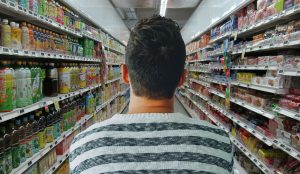GUIDANCE FOR GROCERY STORES AND LOCAL BOARDS OF HEALTH ON THE MARCH 25, 2020 ORDER OF THE COMMISSIONER REGARDING GROCERY STORES ISSUED APRIL 7, 2020

Woman shopping in grocery store
On March 25, 2020, the Commissioner of Public Health, issued an order relevant to grocery stores to provide continuation of essential services while additionally reducing exposure of shoppers and employees to COVID-19 (hereinafter, the Order). This guidance is issued pursuant to that Order to further clarify and enable essential services to be provided.
1) Store Specific Maximum Permissible Occupancy Levels
a. Each Grocery store shall limit occupancy to 40 percent of its maximum permitted occupancy level as documented in its occupancy permit on record with the municipal building department or other municipal record holder in order to provide for in-store social distancing while preserving sufficient access for the public to supplies of food and necessities.
Stores with a maximum occupancy of 25 persons or less are exempt from this requirement. Local boards of health should consult with these stores to ensure appropriate protections are in place.
b. Grocery store staff shall monitor the number of customers entering and exiting the store in order to demonstrate compliance with the maximum permissible occupancy level.
c. The occupant count shall include customers and employees.
d. No Local Board of Health shall prescribe or enforce a different limitation on Grocery store occupancy levels.
e. Grocery stores may calculate and employ an average number for staff per shift in counting employees present in the retail selling space to account for incidental movement of employees in and out of retail selling space.
2) If lines form outside the grocery store, staff should monitor the line to ensure customers are maintaining appropriate distance from each other.
3) If lines form outside the grocery store or other physical security concerns arise, local law enforcement should be notified and consulted.
The Commonwealth of Massachusetts Executive Office of Health and Human Services Department of Public Health 250 Washington Street, Boston, MA 02108-4619
CHARLES D. BAKER Governor
KARYN E. POLITO Lieutenant Governor
MARYLOU SUDDERS Secretary
MONICA BHAREL, MD, MPH Commissioner Tel: 617-624-6000
www.mass.gov/dph
 4) Local boards of health are advised to minimize the application of specialized rules that dictate which products grocery stores may or may not be offered for sale to the public and how those products may be displayed. Where local boards of health have particular concerns about individual products, the boards should consult with store operators to discuss the value of special safety protocols to reduce risk.
4) Local boards of health are advised to minimize the application of specialized rules that dictate which products grocery stores may or may not be offered for sale to the public and how those products may be displayed. Where local boards of health have particular concerns about individual products, the boards should consult with store operators to discuss the value of special safety protocols to reduce risk.
5) As grocery stores are a critical provider during this time local boards of health should work with these businesses to ensure that food and essential products are available to the public without disruption. Every effort should be made to ensure continued operation of grocery stores. If health concerns develop with respect to the operation of an individual grocery store, local boards of health should make all efforts to address the concerns with the grocery store instead of seeking punitive measures.
6) If a grocery store offers online delivery or curbside pickup capabilities, customers should be encouraged to use those methods before coming into the store.
7) Grocery stores should communicate with customers through in store signage and public service announcements. Where practical, retailers should designate one-way aisles in stores to maximize spacing between customers and should identify the one-way aisles with signage and floor markings.
8) The entirety of the Commissioner’s Order of March 25, 2020, remains in place. However, grocery stores are reminded that they must continue to provide alternative hours, at least one hour every day in the early morning, for adults 60 years and older in order to limit their potential exposure. These hours must be conspicuously posted and should be enforced by grocery stores.
